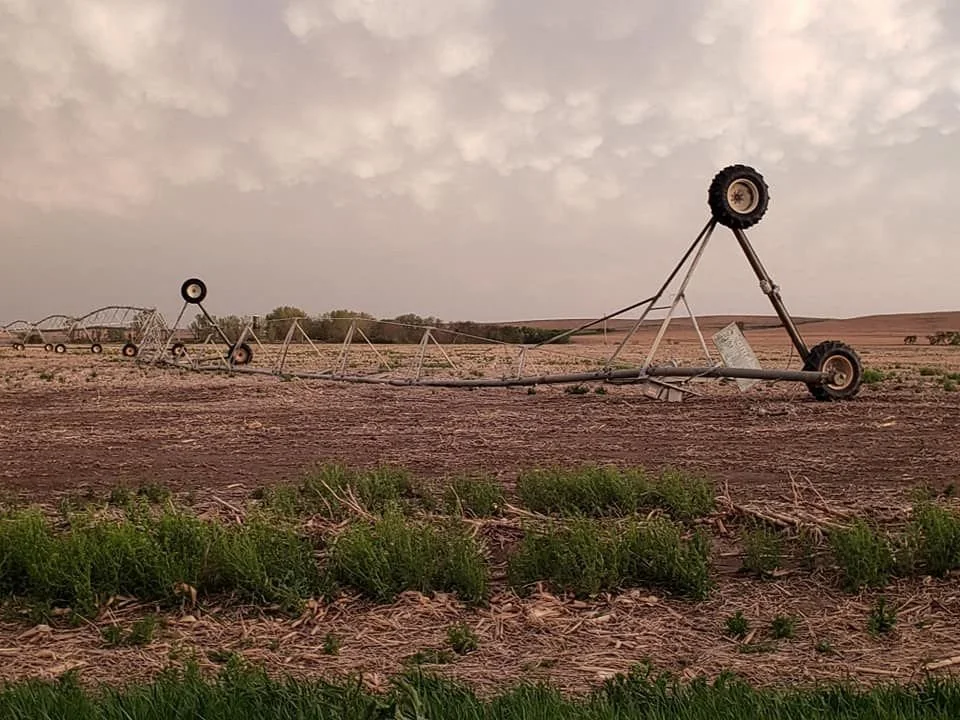The 2023 Atlantic Hurricane Season Is Now Underway. Here's What To Know
It's time for residents along the southeastern U.S. coastlines to make sure their storm plans are in place as the 2023 Atlantic hurricane season gets underway on Thursday.
Forecasters are predicting a “near-normal” season, but Mike Brennan, the new director at the National Hurricane Center in Miami, stressed during a Wednesday news conference that there's really nothing normal when it comes to hurricanes.
Read More
It’s Been a Rainy Week, but Drought Persists in Parts of Louisiana. Here’s Why
Louisiana's months-long drought could be coming to an end soon.
The U.S. Drought Monitor, a collaboration between the National Oceanic and Atmospheric Administration, National Drought Mitigation Center and U.S. Department of Agriculture, has designated most of southeast Louisiana as abnormally dry, with some areas experiencing moderate drought.
Read More
What El Nino Watch Means For Louisiana And Mississippi
An El Niño Watch has been issued by the National Oceanic and Atmospheric Administration (NOAA). Experts at NOAA’s Climate Prediction Center (CPC) that monitor global patterns issue a watch when conditions favor the development of El Niño within the next six months.
Read More
USDA Expands Hurricane Insurance Protection
Farmers may now be eligible for further protection against damaging tropical storms. After hearing directly from agricultural producers, the U.S. Department of Agriculture (USDA) is expanding its Hurricane Insurance Protection-Wind Index (HIP-WI) Endorsement with a Tropical Storm Option. USDA’s Risk Management Agency (RMA) will offer this option for the 2023 crop year.
Read More
Climate Continues to Challenge Agriculture
The average annual temperature of the contiguous United States was 53.4 degrees F, which is 1.4 degrees F warmer than average, ranking in the warmest third of the record.
Annual precipitation for the contiguous United States was 28.35 inches, 1.59 inches less than average, ranking in the driest third of the historical record.
Read More
Low Water Levels on Mississippi River Pose Another Economic Threat
The U.S. supply chain might be on the receiving end of a 1-2 punch that could crater an economy veering toward a possible recession.
In addition to a possible strike by railroad workers, a drought in the Midwest has slowed barge traffic on the Mississippi River, which is at the lowest water levels in 23 years.
Read More
Lower Mississippi River Levels Mean Problems for Farmers and Could Mean Higher Consumer Prices
Due to a month-long lack of rain in the Mississippi Valley, river levels are more than 10 feet below normal, causing cruise ships to run aground and preventing cargo ships and barges from dropping off crops at their destination docks.
Louisiana officials are calling for more dredging of the river to try and ease a problem that they say will wind up costing consumers.
Read More
Rain Is a Good Thing: Farmers Rejoice After Heavy Rain
Most people do not give rain a second thought, but for farmers, it is sometimes all they can think about.
“It’s every day, you go to bed thinking about it at night, you wake up early in the morning way before daylight thinking about it, that’s just a farmer,” said Keith Lacombe, owner of Keith Lacombe Farms.
Read More
Hurricane Predictions Trimmed But Forecasters Still See Busy Season
The National Oceanic and Atmospheric Administration today trimmed its hurricane season outlook from a 65% chance for above normal activity to 60% and increased the odds of a normal season from 25% to 30% because of uneven sea surface temperature, including a patch of cooler water off Portugal. Parts of the Atlantic are warmer than normal, but the variability has forecasters “backing off on the higher end” of their predictions, says lead hurricane outlook forecaster Matthew Rosencrans.
Read More
La Nina May Further Disrupt Commodity Markets via Hurricanes
As if commodity markets needed any more drama this year, this year’s Atlantic hurricane season could be the seventh-consecutive with above-average activity, raising risks for U.S. grain exports as well as oil production and refining capacity.
Significant disruptions for U.S. commodities resulting from hurricanes are more the exception than the rule, but tight global stocks, high prices and geopolitical conflicts could amplify any storm impacts that surface this year.
Read More
Prep For Another Busier Than Normal Hurricane Season With Tips From Storm Experts
South Louisiana is no stranger to hurricanes, but after Hurricane Ida’s destruction last year—16 years to the day since Katrina hit—preparation is more important than ever as the 2022 Atlantic season begins.
Read More
The 2022 Hurricane Season Is here; Prepare Now For Potential Storms
Hurricane season is once again upon us, and the LSU AgCenter has recommendations to mitigate potential damage and losses to yards, homes and pets as well as tips for keeping food and cleaning supplies on hand.
While not as active as the historic season of 2020, 2021 saw 21 named storms — including seven hurricanes, four of which were major. One of these, Ida, was a Category 4 storm second only to Katrina in its damage to Louisiana.
This year, the National Oceanic and Atmospheric Administration (NOAA) is predicting an above-average season with the potential of 14 to 21 named storms, six to 10 hurricanes and three to six major hurricanes. AgCenter specialists have some guidance for staying prepared.
Read More
Summer Hurricanes, Wildfires and Storms Loom as FEMA Faces Pressure to Step Up
Another grueling summer disaster season is arriving, and the Federal Emergency Management Agency is under intense pressure even as its portfolio balloons, it pleads for more money from Congress, and criticism comes on several fronts.
The agency manages more than 300 disaster declarations a year, a dramatic increase from the average of 108 disasters it responded to just a decade ago. For 2022, the disaster outlook is daunting.
Read More
Louisiana Lawmakers Ponder Gasoline Stockpile for Hurricanes
Louisiana already has 1 million gallons of fuel available if needed for its hurricane response efforts. State lawmakers are considering setting aside another 4 million gallons to address critical shortages in the wake of major storms.
Rep. Daryl Deshotel, R-Hessmer, has proposed the Louisiana Strategic Fuel Reserve in House Bill 1057. It calls for the state to spend $25 million to build three storage tanks at the Central Louisiana Regional Port in Alexandria, according to the bill’s fiscal note. Two tanks would hold gasoline and diesel, and the third would contain ethanol for blending fuels.
Read More
Availability of Low-Interest Physical Loss Loans for Louisiana Producers Affected by Natural Disasters
Physical loss loans can help producers repair or replace damaged or destroyed physical property essential to the success of the agricultural operation, including livestock losses. Examples of property commonly affected include essential farm buildings, fixtures to real estate, equipment, livestock, perennial crops, fruit and nut bearing trees and harvested or stored crops and hay.
Read More














